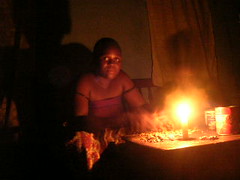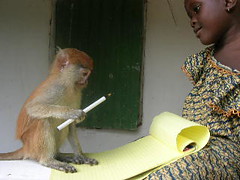Campaigning for Girls' Education
When Hoja's mother started having babies, she was all of fourteen. She tells me her husband is great because "he never beats me." She wakes up everyday and pounds rice, goes to the field, works in the garden, washes by hand, cooks, prays, and gets up to do it again the next day. Needless to say she cannot read, but has nonetheless acknowledged the value of education and sent her seven surviving children to school. I can't help wondering how she feels about it all, watching those daughters turn seventeen, eighteen, twenty without husbands, watching them leave the bent-over life of rice planting for clerical jobs and jeans. I wonder what goes through her head when Hoja comes to me with a question from her schoolwork, or to explain a word from the latest novel the girl is struggling through. I wonder if she feels left out, or if somehow her children should. I wonder what gets lost in the process of schooling a nation of girls whose mothers and grandmothers never knew a book from a stone, or the individual from the group.


